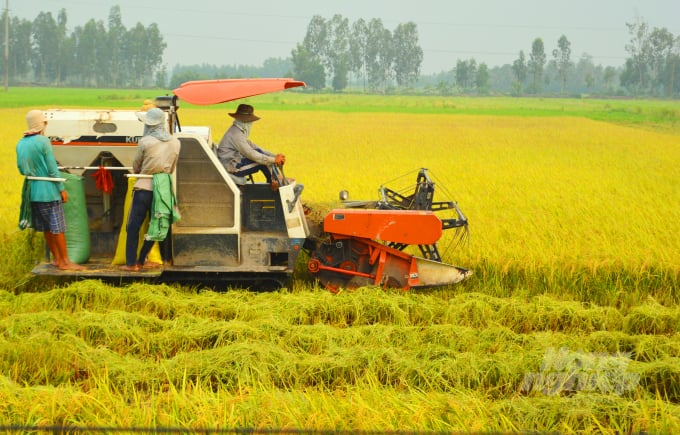November 27, 2025 | 22:43 GMT +7
November 27, 2025 | 22:43 GMT +7
Hotline: 0913.378.918
November 27, 2025 | 22:43 GMT +7
Hotline: 0913.378.918

By 2030 Vietnam's agricultural industry is expected to maintain food exports at over USD 30 billion every year.
Deputy Prime Minister Tran Luu Quang has just signed Decision No. 300/QD-TTg approving the National Action Plan to transform a transparent, responsible and sustainable food system in Vietnam by 2030.
Accordingly, the agricultural sector will carry out the transformation of the food system in a transparent, responsible and sustainable direction, which is the most basic and important task in ensuring national food security and demonstrating Vietnam's responsibility for food security in the region and the world.
The food system transformation will be associated with the development of ecological agriculture, strengthening competitiveness, enhancing resilience to global shocks, contributing to improving the reputation of Vietnamese agricultural product brands worldwide.
The Action Plan also focuses on raising income for producers, ensuring food safety for consumers, ensuring access and enjoyment of healthy food for all subjects in all situations, especially for disadvantaged areas, poor and vulnerable groups. The plan will be implemented while integrating resources, mechanisms and policies to create motivation in order to mobilize capital sources inside and outside the country.
The overall objective of the plan is to transform the food system towards transparency, responsibility and sustainability based on local advantages; firmly ensure national food and nutrition security; improve people's income and quality of life; prevent and control natural disasters, epidemics, protect the environment, response to climate change; contribute to the implementation of the sustainable development goals to 2030 of Vietnam and the world.
According to the Action Plan’s vision for 2030, there will be less than 5% of households with severe and moderate food insecurity. The rate of stunting in children under 5 years old will be less than 15%. The rate of emaciation of children under 5 years old will be less than 3%.
The rate of acute poisoning will be recorded below 5/100,000 people within the population. The percentage of areas that have been granted codes for planting areas or farming areas will account for more than 10% of the land area for agroproduction and aquaculture. The number of certified animal disease-free zones and facilities will increase by 5% per year.
The proportion of the value of products from good production procedures or equivalent will exceed 30%. The value ratio of processed agricultural products in the total value of production and processing of agro-forestry-fishery products will be above 50%.
More than 50% of enterprises participating in the agro-forestry-fishery value chain are connected to the National Product and Goods Traceability Portal. The agricultural industry will maintain food export turnover at over USD 30 billion every year.
At the Asia-Pacific Symposium on Agrifood Systems Transformation convened by the Food and Agriculture Organization of the United Nations (FAO) on October 5, 2022, former Deputy Minister of Agriculture and Rural Development Le Quoc Doanh said, “Vietnam is committed to transforming the food system towards transparency, responsibility and sustainability. The Government of Vietnam is clearly aware of the need for close cooperation between countries and actors in the food and food system to create sweeping changes in the entire system.”
Translated by Samuel Pham

(VAN) According to Mr. Vo Minh Thanh, Director of the Tay Ninh Department of Agriculture and Environment, Resolution 57 has created a new development pathway for the locality, shifting from traditional toward modern agriculture.
/2025/11/26/4909-2-154329_878.jpg)
(VAN) Pearl grouper farming in HDPE cages not only delivers economic efficiency but also contributes to protecting the environment, creating jobs, and promoting marine-based experiential tourism.

(VAN) The model of making a living under the forest canopy through the agroforestry system in Van Son commune, Bac Ninh province, is expected to generate an annual income of approximately VND 30 million/ha.

(VAN) Many enterprises in Can Tho are harnessing natural energy and reducing greenhouse gas emissions in their production processes, thereby contributing to the promotion of a sustainable green transition.
/2025/11/24/3536-2-112800_176.jpg)
(VAN) Dong Nai now has tens of thousands of hectares of forests certified for sustainable management, and this area will continue to be expanded in the coming period.

(VAN) Vinh Ha hamlet (Dai Xuyen commune, Hanoi) is shifting away from small-scale farming as households adopt bioscurity into their breeder chicken models.

(VAN) Heavy rains make aquatic species more vulnerable to disease. Proactive water management and high-tech systems help farmers prevent outbreaks and protect yields.